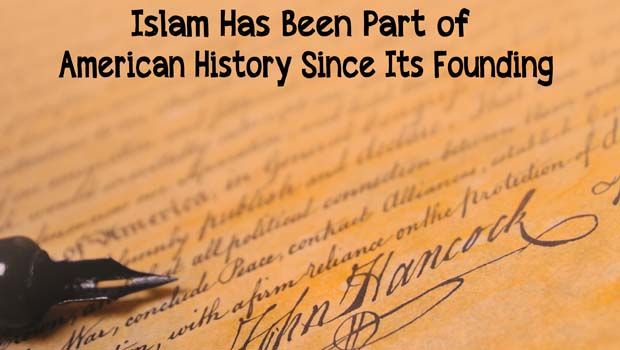“Real pluralism always has an edge of risk especially where the past relations between ethnic groups or between nations in a state have been bad, as is the case in America. Plurality and freedom can let out long pent-up rage and thus destroy states. Or frankness can start negotiations where the groups already have in common things they want to preserve and tighten. In the end there is either freedom of association, cultures and speech for all groups in a wide state, or for none, or for only one. The survival of prospering Muslims in the USA will offer a way forward for all America, and a cultural and human link to the Third World that may help both these worlds in the long term” (Dennis Walker, from his introduction to Islam and the Search for African American Nationhood).
The egalitarian atmosphere envisioned
by the founding fathers did not ensure
the absence of sectarian religious
sensibilities spilling into the political arena
In his 1987 book, The Second Message of Islam, M. Mohamed Taha describes what he considers to be the ideal society. “The good society is based on three qualities: economic equality…or the sharing of wealth, political equality or democracy, or sharing in political decisions which affect daily life… [and]… a lack of social classes and discrimination based upon color, faith, race or sex. In the good society people are judged according to their intellectual and moral character, as reflected in their public and private lives and demonstrated in the spirit of public service at all times and through every means.”
Taha captures the aspirations of many societies, a vision of which no nation currently fits the description. Implementing and maintaining this high standard under such a lofty philosophy eludes most societies. Yet, as so eloquently enunciated in the Farewell Address of the Prophet Muhammad, Islam insists upon egalitarian social values. The Qur’an and the Prophet’s injunctions aim to eliminate immorality, racial superiority, and gender inequality; and in Umar Ibn al-Khattab’s caliphate, we find the features of the democratic spirit of Islam. Traditions relate that he made the pronouncement in the mosque, “O people! If anyone among you finds any crookedness in me, then he should correct it.” A Bedouin in the mosque stood up and said, “I swear by Allah, if we saw any deviation in you, we would correct it with our swords.” To this Umar replied, “All praise is for Allah, the One who made in this nation people who would correct the crookedness of Umar with their swords.”
Democracy in America is in peril when it fails to embrace all its citizens regardless of race, or accommodate its diverse religious traditions, including Islam
By the dawn of the eighteenth century, America was a fledgling British colony. Europe had already experienced the Enlightenment; however, it was more than a century away from the abolition of the international slave trade and the beginning of the Industrial Revolution. To a degree, France and Britain experimented with progressive social ideas, but would come to learn much about governing from distant cousins across the pond. In Virginia, for example, a small group of wealthy elites, with backgrounds in business, law, and government, envisioned a society much like the one outlined by Taha and Walker. From a handful of revolutionary ideas about government, the ambitious founding fathers created a foundation upon which this great nation depends. Familiar with the history of past civilizations with suppressive, monarchal rule which demolished many a society, they set forth the task of reducing to writing America’s founding philosophy. From this bold and soaring act, these sagacious authors catapulted America into the mainstream of world history.
America continues to strive to achieve the principals of a great nation. While we have the luxury of basking in past achievements, at the same time, we cannot afford to simply embrace America’s successes. When reaching for the future, we must examine our failures, and for the betterment of this country, resuscitate the founding principals. The flag we wave is not for a singular religious or cultural entity; it flies for the cause of multiracialism, multiculturalism, and religious pluralism. Salient within the American vision for a diverse society, which evolved slowly from the first American thesis of relative egalitarianism, the founding fathers presented to the world a humanitarian blueprint which aspired to level the playing field and remove divisive class differences. Ralph Waldo Emerson wrote that America’s governing principles were designed to arbitrate differences between diverse groups, and that adherence to the founding thesis was so powerful he considered it a form of religious conversion.
Benjamin Franklin, Thomas Jefferson, and John Adams, heartened by the colony’s determination to secede from Britain, were consumed by the notion of providing individuals their freedom to choose how to practice Christianity. And they strove to secure this right for a free European-expatriate citizenry, no longer subject to enforcement of an official religious creed by England’s oppressive authorities. The language scripted into the American Declaration of Independence later emboldened the drafters of the U.S. Constitution to guarantee freemen choice to traverse any spiritual highway, as long as overthrow of the government was no part of the creed. The crafters of the most revolutionary document in American history could not, of course, see the future and the 21st century waves of migrants of varying religious persuasion from all corners of the globe moving to the U.S. They could not have predicted the level of fear or the degree of violence perpetrated against Muslims. They could never have anticipated the impact of broad-based religious diversity, and even though some Muslims insist the Quran influenced Jefferson, none of the founding fathers saw the eventual emergence of Islam in America.
The narrative of Muslims in America might help all of us to explore the greater good deep within the American consciousness
In the course of time, what distinguished American Democracy from other forms of government was a melding of bold ideas, liberal beliefs, and charitable sensibilities born from a yearning for religious freedom, which, amidst much resistance, later evolved into tolerance for religious plurality. While conceding the ingenuity of the founding fathers, religious freedom for the various Christian denominations, rather than religious plurality, was their undertaking. The founding documents focused on personal liberties and the responsibilities and limitations of government. The writings of Montesquieu and John Locke’s Second Civil Treatise on Government were exceedingly more influential to the founding fathers than the Quran. Government as derived from the consent of the people and lodged in the agency of the body politic became the cornerstone of the nation. When driving the decisive wedge between church and state, the original authors settled the most pressing question haunting the first colonists; however, because of the predominance of Christianity, religious pluralism was not part of the debate. They passionately wrote of religious freedom, which eventually underscored the importance and constructed the space for religious plurality. The idea of freedom was specific: it meant separation from the Church of England, and signaled a resounding consensus for a new American nationality amid the cultural diversity of the European colonization. With indentured servitude at first and then slavery fueling the engine of nation-building, America was well on its way to establishment of institutional racism. Ironically, however, it was more dedicated to plurality (albeit that power and freedom was only for those of European descent) than any other nation.
The Declaration of Independence was essentially a declaration of separation, between two bodies of land but more importantly as a casting off of the shackles of religious intolerance. As America conceived democracy, the world’s most profound human experiment, commitments to capitalism, slavery, religious and racial singularity were nonetheless made. This is part of what made the country unique and desirable to Protestant Europeans arriving in America. By the end of the nineteenth century, America’s pledge to “all men are created equal” would be tested. The new nation learned to manage diversity through the separation of races and of religions, even though such divisive cultural mores contradicted the idea of tolerating, and more than that, appreciating and celebrating differences. The sense of identity of most nations is based on a common history. America’s self-identity is based more on ideals and values. But as human beings too often fail to realize the ideal, it was not American high-mindedness, but American fears and prejudices that issued forth a society riven by racial and religious divides. The religious divisions, though, often lay beneath the surface.
Democracy and the principle of religious pluralism within our national space exist because of the separation of “church” (representing any and all religions) from the state. This suggested but did not guarantee a tolerant society of “reinvented Europeans.” The egalitarian atmosphere envisioned by the founding fathers did not ensure the absence of sectarian religious sensibilities spilling into the political arena. In fact, both Catholicism and Judaism were at one time demonized religons.
Indelible ideas were written passionately into the American Declaration of Independence — “…that all men are created equal, that they are endowed by their Creator with certain unalienable Rights, that among these are Life, Liberty and the pursuit of Happiness.–That to secure these rights, Governments are instituted among Men, deriving their just powers from the consent of the governed…” Yet, at that time in American history, democracy only served white, male property owners. John Adams, one of the Massachusetts signers of the Declaration of Independence, who became the second president, articulated the common view in 1776 that opening the vote to all people would “confound and destroy all distinctions, and prostrate all ranks to one common level.”
Despite such viewpoints, a collective, more egalitarian and pluralistic American perspective grew dramatically over the next century. The early settlers searched for political unity, and honored the belief that America would unite them by common ideals. Gunnar Myrdal, the pioneering Swedish sociologist, in his two volume classic The American Dilemma, noted the hope of the founding fathers —“Americans of all national origins, classes, religions, creeds, and colors, have something in common: a social ethos, a political creed.” Still, by the close of the eighteenth century, the claim of patriotism was permitted to a single religious tradition. While being secular deists themselves, the founding fathers never anticipated the increasing numbers of non-Christians in America. Yet they built into American democracy a core belief in God which then expands outward in secular concentricity in order to check the predomination of any one religion. They created a paradigm in which government does not endorse or preclude religion, but focuses on protecting the rights of all citizens regardless of religious orientation. The founding fathers ventured far past satisfying the aspirations of the original Euro-American Christian society. They opened the door of religious expression, touted a new mission in early America — that the nation was divinely inspired, and they presented a newly defined nationalism that was religiously disconnected from Europe.
The era of the first American Thesis, although incomplete, represented belief in not only the spirit of an independent nation capable of managing its diversity, but also in America’s role as a soft power in the world. This concept, in current times enunciated by Joseph Nye of Harvard University, describes a persuasive rather than coercive approach to international relations, typically involving the use of economic or cultural influence. As far as managing its heterogeneous citizenry, Canadian sociologist Sacvan Bercovitch describes American diversity as, “a hundred sets and factions, each apparently different from the others, yet all celebrating the same mission.”
The dream of democracy’s promised equality began to open to minorities finally in the 20th century. Jim Crow laws maintained two worlds, with whites and blacks kept apart by blatant misinterpretations of Christianity and intentional “liberties” with various Bible verses to promote the idea that God supported racial segregation; by anti-black legislation and by unwritten, but strongly enforced local customs which enforced a racial hierarchy. The brilliant two-volume work written about America by Alexis de Tocqueville in 1835 depicts a deeply troubled early America, predicated on the clashes brought about by slavery. And we can infer from his observations the existence of intolerance of other religious traditions by mainstream Christianity. He attributed the social fragility in the new nation to the un-preparedness of white Americans to mix with those of other races and religions. He scripted a most poignant and stimulating critique of the American people, questioning if racial and religious intolerance would eventually undermine the American experiment.
Ironically, even prior to the first half of the twentieth century, despite inequality, discrimination, and exploitation, the world viewed America as the progressive model for modernity. And just as ironic, until the 1950s, no other religious form ever challenged the dominant motif of Christianity which had been sewn into the American tapestry, interwoven with threads of liberty, pluralism, and unimpeded individualism, national moral fibers that remained more potential than actualized.
Today, the right wing Republican party shamelessly continues to obstruct that actualization. Democracy in America is in peril when it fails to embrace all its citizens regardless of race, or accommodate its diverse religious traditions, including Islam. Within a pluralistic society, people of all persuasions have certain rights, including the right to privacy, access to health services, education, housing, and equal protection under the law. A secular, pluralistic state guarantees the right to practice the religion of one’s choice, to engage in political life, and to pursue one’s own selected occupation and favored leisure activities. Democracy also guarantees the right to vote within a free and frank public square where America’s direction and challenges are openly debated.
Muslims, like Christians and Jews, bring a distinctive religious ethic into public life. Islamic ethics, like Judeo-Christian ethics, can remind America’s citizens to steer clear of that which corrupts. Thus traders might weigh with fairer measure, astronomers explore the cosmos with more reverence, police investigate and enforce the law with utter justice and more compassion.
In scripting the American constitution, the original visionaries created a framework essential for a young nation of migrant farmers, aspiring entrepreneurs, and yet-to-be-emancipated slaves to co-exist under the American Thesis. That national proposal must reserve a space for the inclusion of Muslims and followers of other religious traditions to co-habitat the land.
The narrative of Muslims in America might help all of us to explore the greater good deep within the American consciousness. What lies within is a rich diversity that promises a genuine actualization of liberty, pluralism, and unimpeded individual choice. Remember, it has been said, Men may get scruples in the future that they have not thought of now.





